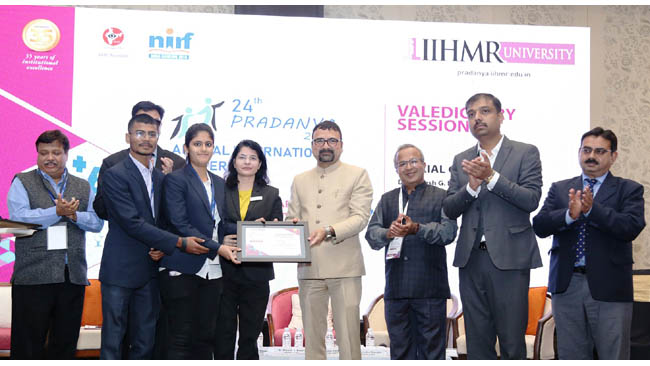
November 26, 2019 / JAIPUR: Pradanya 2019,
the annual international conference of IIHMR University, Jaipur, successfully
concluded with distribution of awards to deserving students for the research
papers and posters submitted on various themes of healthcare. The third and
last day of the event saw a slew of sessions in which health experts and policy
makers brainstormed on topics such as purpose-driven startups and innovation
for maximum health impact, strategies for effective implementation of SDG 2030,
and Accessibility, affordability and acceptability.
In his valedictory speech, Dr Pankaj Gupta, President, IIHMR University, Jaipur, said: “Since the last 23 years, Pradanya has been focusing on the most relevant and burning topics of healthcare that have immense significance for India and rest of the world. This year too, more than 35 health experts from all over the world participated in the 24th edition of Pradanya 2019. I was amazed at the quality of insights shared and the immense interest of audiences and IIHMR students in the discussions. The intellectual churning generated by the event will give a long way in giving all stakeholders and upcoming industry leaders a better understanding of how to effectively meet the gaps in Indian healthcare and prepare it to meet the challenges of the future.”
Addressing the audiences, Mr. Naveen Jain, Secretary, Dept. of Skill, Employment & Entrepreneurship Development, Govt. of Rajasthan, said: “Startups and innovation are critical to the economy, and the government has a huge role to play in encouraging entrepreneurs. While innovation is welcome, innovators need to avoid duplication of efforts, with similar startup ideas being presented by young entrepreneurs with minor improvements. This leads to wastage of efforts.Public-private partnership is the way forward for improving healthcare system, but the roles of the private entrepreneur and the government have to be clearly laid down. The government needs to think of innovative ways for healthcare delivery. For example, Employees' State Insurance Schemein Rajasthan spends Rs 150 crore every year on about 30 lakh OPD visits. Why not give Rs 500 coupons to patients covered under the scheme so that they can get themselves treated anywhere? The government needs to invite people to provide services rather than providing service itself.“
Said Mr. Gaurav Malhotra, Managing Partner, Ikizia Advisors: “Founding a new business or startup in India is still cumbersome and takes anywhere from 60 to 90 days. It is a myth that Inspector Raj has gone away – it still exists. As many as 137 licenses are needed even today to start a new hospital in India. Another major challenge the Government has created for the entrepreneur community is the angel tax. This tax is ambiguous and has hugely impacted angel investments in startups. It a punishment for innovators. Yet, despite all the pessimism, investment is happening in Indian startup ecosystem. Indian startups have seen a staggering investment of Rs 56,000 crores from January to September this year, which is a rise of 16% over last year. Another issue is that the government has begun to regulate prices for hospitals and healthcare service delivery. This is impacting profit margins. How can a hospital charge government rates when for a hospital, no subsidies are given and they buy everything, from land to electricity, at commercial rates like any other business?”
Said Manish Diwan, Head Strategic Partnership & Entrepreneurship, Biotechnology Industry Research Assistance Council (BIRAC), Govt. of India: “Today’s youth have immense opportunities in startups in healthcare and biotech space. Grants of Rs 50 lakh to Rs 7 crore are available from BIRAC for startups, with a slew of incentives. We have tie-ups with more than 40 incubation centers all over India and funding is not a problem.The onus is now on the innovators to come up with unique ideas that can be incubated and taken to market. It now just takes a day to register a new startup. to We are currently directly supporting more than 1,000 startups. They have already successfully commercialized 130 products. It is time for today’s students to turn into job givers from job seekers. If they venture into entrepreneurship, an entire ecosystem today exists to support them right through funding and mentorship to ideation and commercialization.“
Said Prashant Mohanty, Director – Sales & Marketing, Emcure Pharmaceuticals Ltd: “India is the pharmacy capital of the world, supplying affordable drugs to every nation. While efforts are being made to address the issue of affordability through schemes like Ayushman Bharat, the two other aspects – Awareness and Acessibility – remain largely unaddressed. It is important to take care of the last mile. With rising incidence of non-communicable diseases, self-management and point-of-care devices are going to play an increasingly critical role in reducing morbidity. We need policy changes in this regard about what kind of information the pharma companies can give to patients. They need to join hands with policy makers and hospitals to address the issues of accessibility and awareness. That is how we can shift the needle from illness to wellness.”
Dr. Nimesh G. Desai, Director, IHBAS, Govt. of India; Dr. Harsha Vardhan, Founders and Group MD, MedAchievers; and Dr Devendra Khandait, Deputy Director, India Office, Bill & Melinda Gates Foundation, were special guests at the valedictory session of Pradanya 2019.